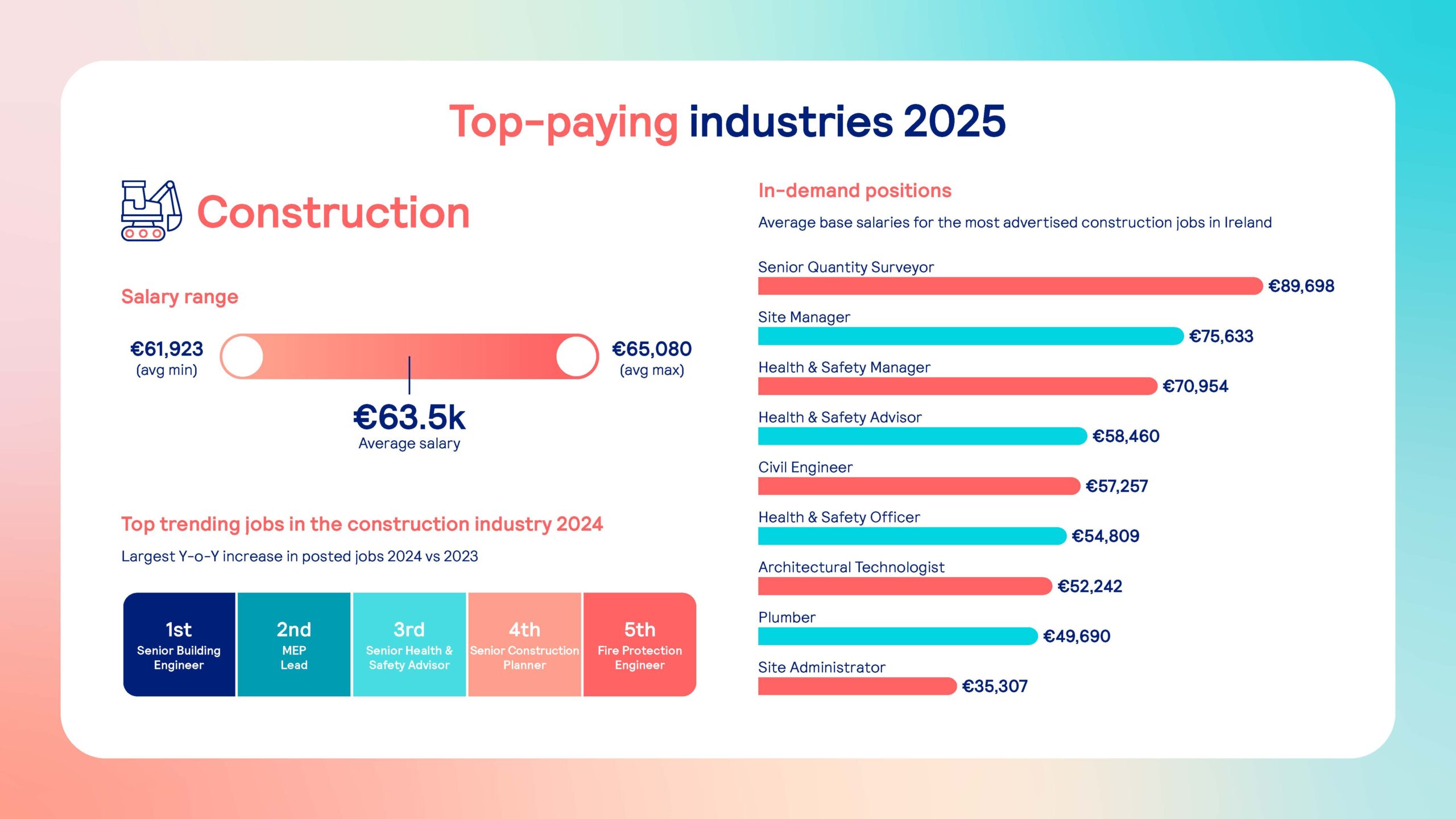In 2024, Ireland’s labour market demonstrated robust growth, with employment hitting a record high of 2.8 million, meaning almost three-quarters of Ireland’s working-age population is employed. Unemployment has remained low, standing at 4.2% at the end of the year, with projections indicating it will average around 4.5% throughout 2025. This competitive job market continues to pressure employers to attract and retain talent.
Understanding what jobseekers value most – such as salary, benefits, and work-life balance – is essential for employers. These insights are key to shaping recruitment, employer branding, and retention strategies, giving businesses a competitive edge.
The IrishJobs salary and benefits guide offers salary benchmarks and benefits data across key industries, clarifying market expectations. For employers, it’s a critical resource to refine hiring strategies; for jobseekers, it offers transparency into potential salaries and benefits. In today’s competitive market, leveraging these insights will help businesses secure top talent for 2025 and beyond.
Top-paying industries
IT
The IT industry continues to lead in salaries, with an average pay of €69k. High-demand roles such as Scrum Master (€85,563) and Senior Software Engineer (€83,373) remain among the best-paid positions, driven by the growing reliance on agile development and advanced programming skills. Additionally, Data Engineers (€73,555) and Automation Engineers (€68,109) are in demand due to the increasing focus on data infrastructure and process automation.
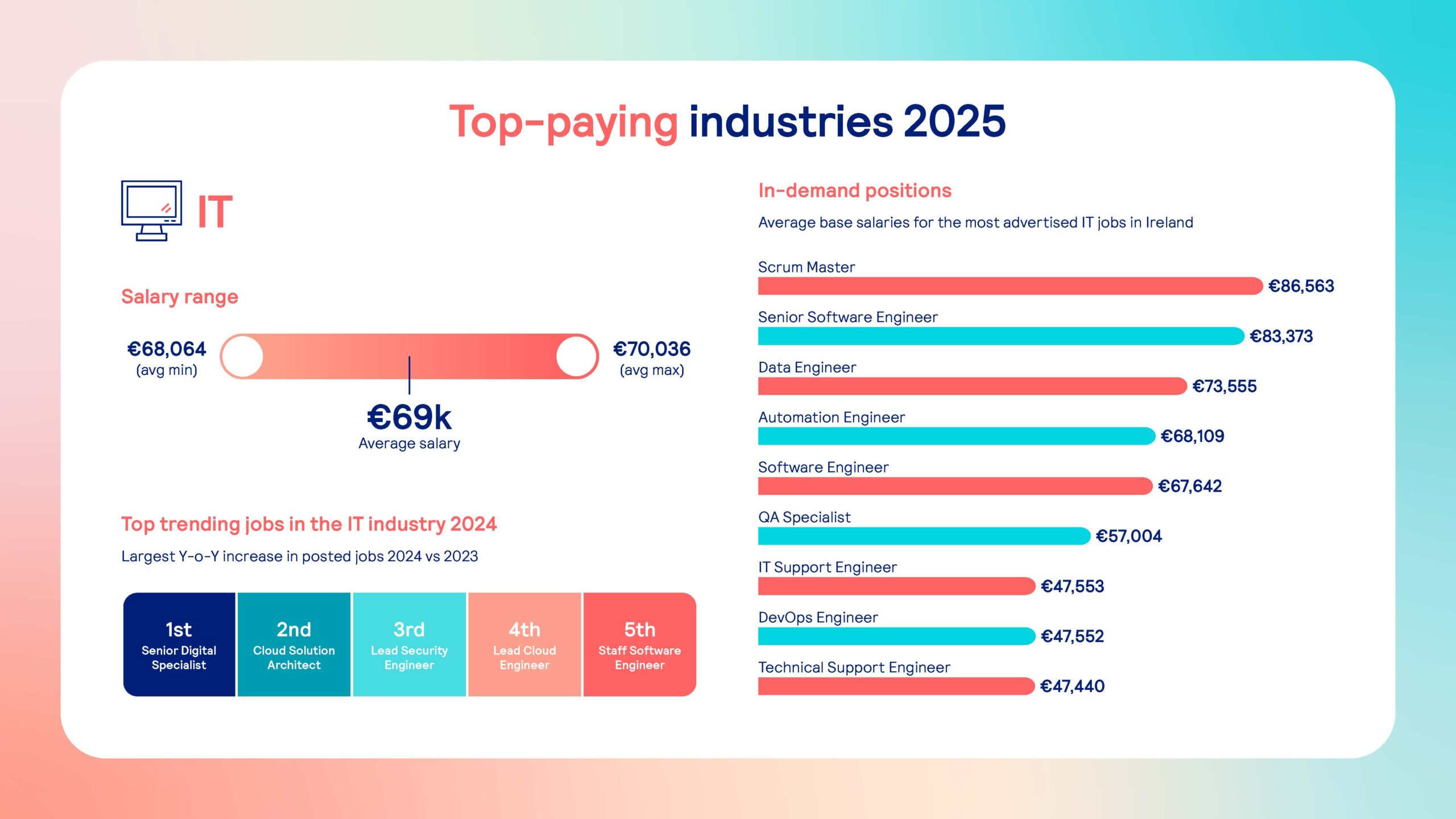
Construction
With an average salary of €63.5k, the construction sector offers substantial earning potential, particularly in leadership and safety-related roles. Positions like Senior Quantity Surveyor (€89,698) and Site Manager (75,633) command high salaries, emphasising the need for experienced professionals in large-scale project management. Additionally, health and safety roles, including Health & Safety Manager (€70,954) and Health and Safety Advisor (€58,460), remain vital as companies prioritise workplace safety and compliance.
Accountancy
The accountancy sector remains a strong choice, with an average salary of €55.7k. Leadership roles such as Financial Controller (€82,776) and Senior Financial Accountant (€74,604) reflect the sector’s need for strategic oversight and high-level financial management. Other key positions, including Management Accountant (€63,933) and Financial Accountant (€64,728), showcase the demand for analytical expertise in corporate finance.
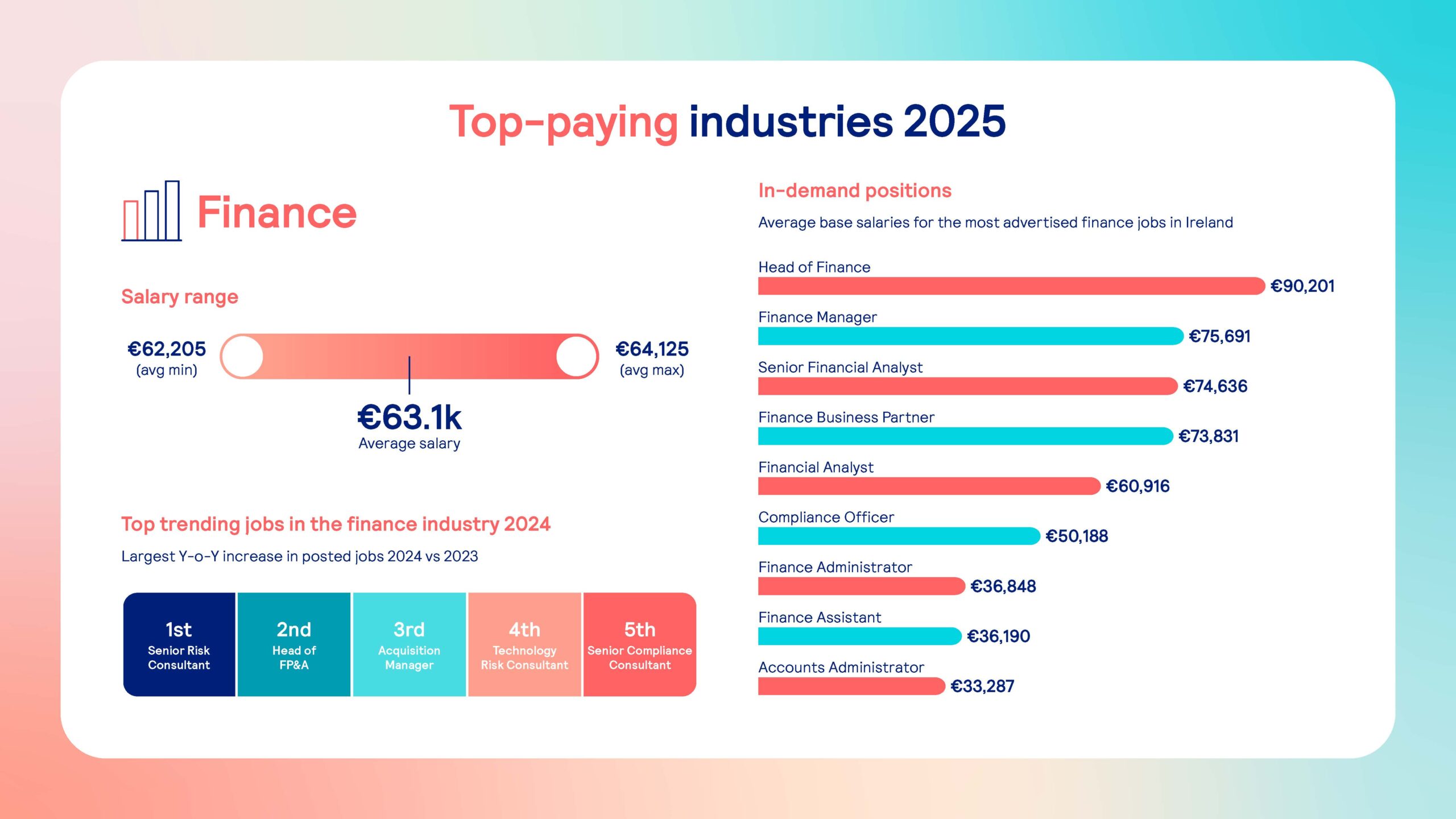
Finance
With an average salary of €63.1k, finance remains a lucrative industry, particularly for senior professionals. High-paying positions include Head of Finance (€90,201) and Finance Manager (€75,691), underlining the sector’s reliance on financial leadership and business strategy. Other well-compensated roles, such as Senior Financial Analyst (€74,636) and Finance Business Partner (€73,831), highlight the importance of data-driven decision-making and cross-functional collaboration.

Engineering
Engineering continues to offer competitive salaries, with an average pay of €59.8k. Top[ earners include Senior Engineers (€72,682) and Electrical Engineers (€67,683), reflecting the demand for expertise in system design and energy efficiency. Other key roles such as Process Engineers (€64,536) and Network Engineers (€64,522), emphasise the industry’s focus on automation, telecommunications, and industrial innovation.
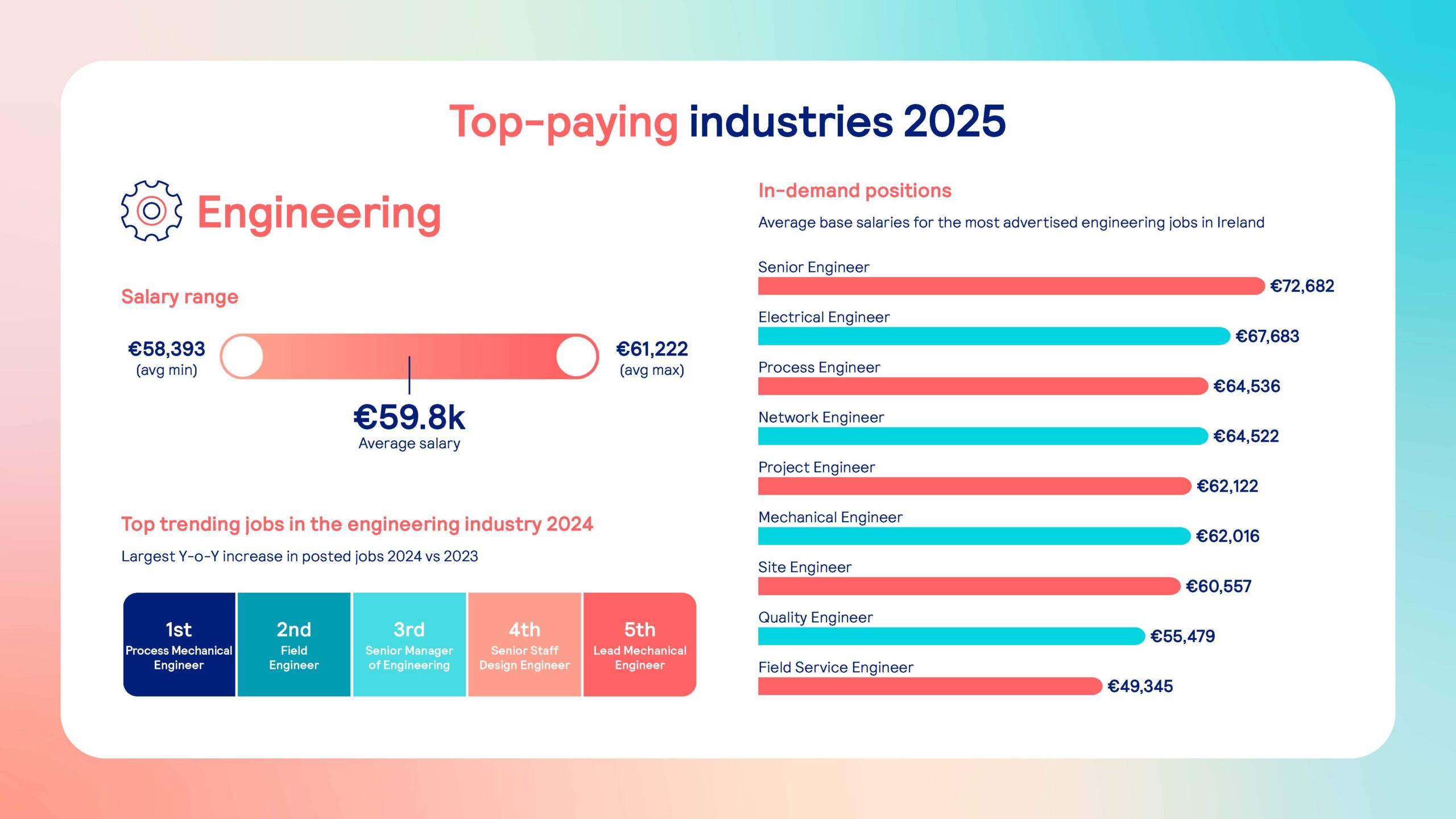
Top workplace benefits of 2025: what jobseekers value most
As competition for top talent intensifies, businesses are prioritising attractive benefits to retain and attract employees. According to the latest insights, free parking has emerged as the most sought-after workplace benefit, reflecting the ongoing challenges of commuting and the cost of city centre parking.
Following closely, pension schemes remain a key priority, highlighting employees’ long-term financial security concerns. The cycle-to-work scheme ranks third, emphasising the growing shift toward sustainable and cost-effective commuting options.
Flexible working arrangements, including remote work and flexible hours, take the fourth spot, reinforcing the demand for work-life balance post-pandemic. Finally, career development opportunities round out the top five, showcasing employees’ focus on professional growth and advancement.
These trends demonstrate a shift towards benefits that enhance both financial well-being and work-life balance, reflecting the evolving expectations of the modern workforce.
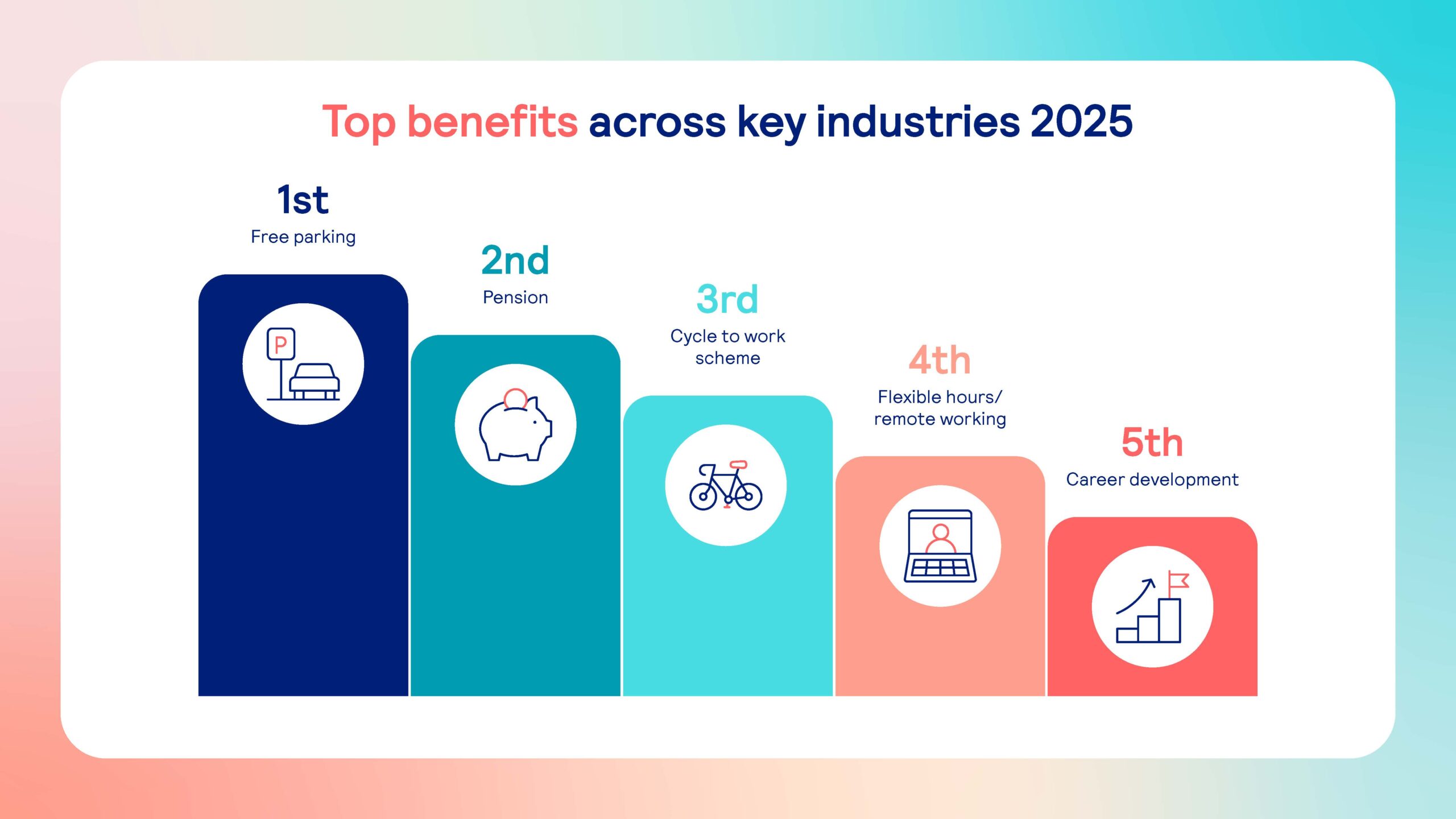
Industry Highlights:
In 2025, industries are experiencing notable shifts in salaries and workforce demands across various sectors. Want to explore the latest trends in other industries including, Manufacturing, Logistics, Healthcare, Administration, and Sales?
Download the full guide here for key insights.
What employers need to do to stay competitive
Building an effective compensation strategy involves planning and attention to detail. While it may seem like a lengthy task, it provides a framework for achieving organisational goals, enhancing employee engagement, and managing budgets. Below are key steps to implement a comprehensive plan:
Align with organisational goals: Your compensation strategy should directly support broader goals like attracting top talent, retaining employees, and improving performance. A clear link between compensation and organisational objectives ensures a focused and strategic approach.
Balance costs and culture: Ensure your strategy is financially sustainable and fits your company culture. Equal pay, budget constraints, and long-term financial goals must be accounted for to maintain trust and stability.
Review roles and market trends: Regularly update job descriptions and analyse market benchmarks using industry reports and salary surveys. Competitive and fair compensation packages help attract and retain compensation packages help attract and retain talent without unnecessary costs.
Engage employees: Gather employee feedback to understand their expectations and identify gaps in current offerings. Involving employees in the process encourages trust and ensures your strategy aligns with workforce needs.
Define and communicate principles: Set clear compensation principles, such as equity, performance-based rewards, and transparency. Open communication about how pay decisions are made builds employee confidence and clarifies pathways for salary increases.
Design a clear structure: Create a framework that includes base salaries, bonuses, benefits, and incentives. Use industry benchmarks to establish salary ranges and ensure equal pay for roles of equal value.
Link performance to pay: Tie compensation to individual and team performance using a robust management system. This approach motivates employees and aligns their efforts with organisational goals.
Monitor, evaluate, and stay compliant: Regularly review your compensation strategy using metrics like turnover rates and employee feedback. Adapt as needed to stay competitive while ensuring compliance with employment laws, including equal pay legislation.
Whether you want to attract and recruit brilliant people, sharpen your hiring strategies, or build your market presence, we’re here with powerful insights and data-backed solutions.


